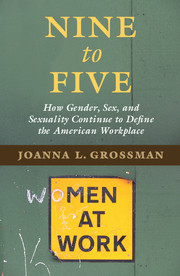Book contents
- Frontmatter
- Dedication
- Contents
- Foreword
- Acknowledgments
- Introduction
- PART I WHAT IS SEX DISCRIMINATION?
- PART II SEXUAL HARASSMENT
- 12 Workplace Affairs and Sexual Favoritism
- 13 Lolita at the Office
- 14 Sex Talk in the Writers’ Room
- 15 Sex Behind Bars
- 16 When the Supervisor Bullies Only Women
- 17 The Equal Opportunity Harasser
- 18 Periodontal Perils
- 19 Punishing Effeminacy
- 20 Late-Night Affairs with David Letterman
- 21 Why Herman Cain Has Not Been Able to Talk His Way Out of His Exploding Sexual Harassment Scandal
- 22 Why Hostile Environment Harassment Is a “Continuing Violation”
- 23 When Sexual Extortion Is Successful
- 24 The Consequences of Failing to Complain about Harassment
- 25 Who Is Responsible for Sudden, Severe Harassment?
- 26 Chinks in the Harassment Law Armor
- 27 Do Employer Efforts Prevent Harassment or Just Prevent Liability?
- 28 Who's the Boss?
- 29 Costly Mistakes
- 30 Hands Off the Merchandise
- PART III PREGNANT WOMEN AND MOTHERS AT WORK
- PART IV FEMALE BREADWINNERS AND THE GLASS CEILING
- Conclusion
- Notes
- Index
21 - Why Herman Cain Has Not Been Able to Talk His Way Out of His Exploding Sexual Harassment Scandal
from PART II - SEXUAL HARASSMENT
Published online by Cambridge University Press: 05 May 2016
- Frontmatter
- Dedication
- Contents
- Foreword
- Acknowledgments
- Introduction
- PART I WHAT IS SEX DISCRIMINATION?
- PART II SEXUAL HARASSMENT
- 12 Workplace Affairs and Sexual Favoritism
- 13 Lolita at the Office
- 14 Sex Talk in the Writers’ Room
- 15 Sex Behind Bars
- 16 When the Supervisor Bullies Only Women
- 17 The Equal Opportunity Harasser
- 18 Periodontal Perils
- 19 Punishing Effeminacy
- 20 Late-Night Affairs with David Letterman
- 21 Why Herman Cain Has Not Been Able to Talk His Way Out of His Exploding Sexual Harassment Scandal
- 22 Why Hostile Environment Harassment Is a “Continuing Violation”
- 23 When Sexual Extortion Is Successful
- 24 The Consequences of Failing to Complain about Harassment
- 25 Who Is Responsible for Sudden, Severe Harassment?
- 26 Chinks in the Harassment Law Armor
- 27 Do Employer Efforts Prevent Harassment or Just Prevent Liability?
- 28 Who's the Boss?
- 29 Costly Mistakes
- 30 Hands Off the Merchandise
- PART III PREGNANT WOMEN AND MOTHERS AT WORK
- PART IV FEMALE BREADWINNERS AND THE GLASS CEILING
- Conclusion
- Notes
- Index
Summary
The story of the sexual harassment allegations against GOP presidential candidate Herman Cain, first broken by Politico, just keeps getting bigger. In addition to the two women who filed formal complaints of harassment against Cain while he was head of the National Restaurant Association (NRA) in the late 1990s, a third woman has now come forward to complain that she was also harassed by him, although she did not file a complaint at the time.
The details of the allegations and the settlements received by the two women who did file formal complaints against Cain have been leaking out in fits and spurts. Meanwhile, Cain has denied any wrongdoing and refused to offer any explanatory details. But we still do not have the whole story, in large part owing to confidentiality clauses in the two settlement agreements that prevent the two women who did file suit from talking about their complaints. These two women risk being sued by the NRA for breach of contract if they step up and tell their sides of the story without first securing a waiver of the confidentiality provision.
For this reason, we may never know exactly what happened at the NRA more than a decade ago and whether it constituted actionable sexual harassment. Certainly, we would be premature in drawing any definitive conclusions about Herman Cain's culpability as a sexual harasser. Yet the allegations against Cain raise important questions about the law and practice of sexual harassment in the workplace that deserve to be answered whether or not the whole story ever comes to light.
Ultimately, Cain's own take on the situation raises some of the most important questions of all.
“THIS BILL OPENS THE DOOR FOR OPPORTUNISTS WHO WILL USE THE LEGISLATION TO MAKE SOME Money.”
So warned Herman Cain in 1991, when he was president of Godfather's Pizza and when Congress was in the process of strengthening federal antidiscrimination law. Through the Civil Rights Act of 1991, Congress created the right of victims of intentional discrimination to seek money damages in court, rather than just equitable relief (that is, a court order or the like). The act also restored various aspects of antidiscrimination law that had been weakened by a series of Supreme Court rulings.
- Type
- Chapter
- Information
- Nine to FiveHow Gender, Sex, and Sexuality Continue to Define the American Workplace, pp. 125 - 129Publisher: Cambridge University PressPrint publication year: 2016



